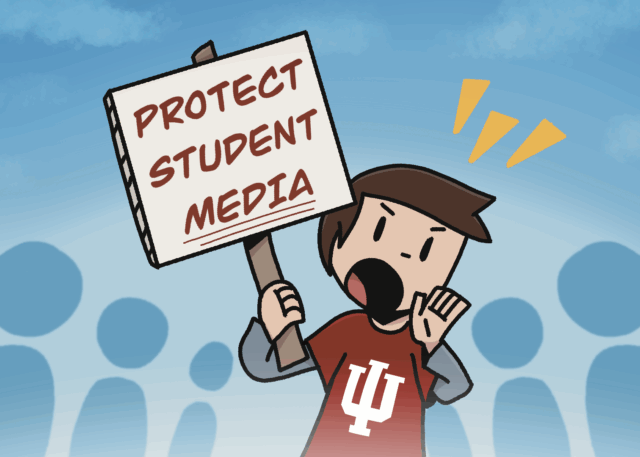By The Editorial Board
Last week, Indiana University crossed a line no public institution should ever approach — it violated the First Amendment by censoring its student newspaper. Student media across the country can’t afford to ignore this, because next time, it could be any one of us.
What’s happening at IU is not just an isolated incident; it’s a warning. The evidence clearly shows that this was not an economic decision by the IU administration but rather something more personal, representing a lack of respect toward student media and free speech.
Indiana University sent an email announcing that they were mandating an immediate halt to production of its student newspaper on Oct. 14. This order came two days before the Indiana Daily Student newspaper was set to release its homecoming print edition. Hours before this message was sent to the newspaper staff, it was relayed to Student Media Director Jim Rodenbush.
After Rodenbush refused to share the message with the IDS staff, he was fired. Rodenbush said he had “no doubt” he was fired because he refused to follow orders to stop publishing, as he said the university had demanded. IU Media School Dean David Tolchinsky wrote in Rodenbush’s termination letter, “Your lack of leadership and ability to work in alignment with the University’s direction for the Student Media Plan is unacceptable.”
This is a clear violation of the First Amendment, a constitutional right that protects student journalists from limitations like these. A public university like Indiana University not only knows better but should be setting an example.
IDS Editors-in-Chief Andrew Miller and Mia Hilkowitz said “IU decided to fire Jim Rodenbush after he did the right thing by refusing to censor our print edition. That was a deliberate scare tactic toward student journalists and faculty. The same day, the Media School decided to fully cut our physical paper, fully ensuring we couldn’t print news. We’re losing revenue because of that decision.”
Rather than viewing news as a necessity, administrations are pushing the press to the back burner — only highlighting it when it’s convenient or helps push an agenda.
According to The Guardian, Indiana University decided earlier in the year that it would shift from weekly print editions to seven per semester to increase profitability. However, former Director of Student Media Jim Rodenbush told The Guardian administrators later decided to disallow news content from being published in print altogether.
As restrictions continued, Indiana University administration took censorship one step further, banning the Indiana Daily Student from publishing its homecoming print. The staff decided to take matters into their own hands by publishing it digitally, with the front page being lit by bold red letters that read “CENSORED,” featuring a subhead that reads “This is not about print. This is about a breach of editorial independence.”
At the core, we could not agree more.
It couldn’t be clearer that this was retaliation, and rather than serving the needs of the students, this was an act of ego and vengeance. No one is ignorant of the ever-changing world of news, especially when it comes to student media. However, being limited by a university — an institution created entirely to prepare and empower people for careers — is a direct hit on all media.
While we can’t deny that digital journalism is becoming increasingly more popular than its print counterpart, the problem here doesn’t relate to viewership. The censorship by the IU administration represents how fragile the right to free press currently is in the U.S. and even more so in student media.
“We want to make it abundantly clear that our resistance to the Media School’s directive isn’t about print itself,” Miller and Hilkowitz said in a statement to The Baylor Lariat. “It’s about maintaining our editorial independence. If IU can irrationally justify censoring stories as a ‘business decision,’ what stops them from applying this thinking to the news and investigative stories that run on our website and social media?
“IU has no legal right to dictate what we can and cannot print in our paper. Is this the best use of our time or the university’s time? We should be working toward financial stability, not censorship.”
Even in the midst of chaos, the Indiana Daily Student has continued publishing everyday news content on its website, showing the news never stops. Student media isn’t just the voice of journalists; it’s the voice for the entire student body — and it depends on you to keep it alive.
Pick up your campus newspaper, open the publication’s website, read the online newsletter and spread the word to your friends — because media censorship doesn’t just affect journalists; it affects everyone.




